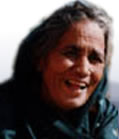 |
 |
||
 |
|||
|
RELATED THEMES family life gender social change OTHER LOCAL THEMES BACKGROUND |
social relationships
Probably the most often voiced observation about social relationships in these interviews is a decline in community spirit, and a rise of individualism. People who lived in joint families now prefer to be in smaller units, and the collective activities - building houses and irrigation channels, harvesting crops - which were such a feature of the past now tend to be done independently or are provided by the state or NGOs. Today, if families need extra labour they often pay for it. While some increase in individualism may be attributable to the shift to a cash economy - when the sharing and exchange of skills and resources was a way of life, relationships between individuals were bound to be more cooperative - some changes reflect practical developments. Jagat (India 10) sums up the difference with a powerful image: in the past one person would strike the spark to light cooking fires and go round the village with it. Now, he says, "every house has matchboxes". ".whoever lit the fire first would provide ignition for the whole of the neighbourhood. Today it is just the opposite, every house has matchboxes. although it must have made people self sufficient, all that talk of community is over." Many older narrators feel that relationships between generations have deteriorated and believe that modern media and the education available to the young generation have played a part in this. "Through TV programmes we come in touch with different cultures and traditions. The feelings of affection for one another is diminishing day by day. Ancient values of our culture - like respect for elderly persons, civilisation and mutual understanding and other tender feelings - are departing.We have become strangers even to our neighbours.The new generation has stopped bidding customary salutations to their elders. They hesitate even in exchanging formal wishes because they see no profit in it." (India 8). The rapid pace of change has widened the gulf of experience between generations as never before, many feel, and they express real concern for the future if generations do not become closer and more supportive. Women talk about improvements in terms of equality with men and within the family, but many cite instances that illustrate the extent to which old prejudices remain. Relationships between castes do seem to have changed, although narrators present different views. Some say relationships were always equal: "People live with friendly relations here, indifferent to one another's caste and creed. But it is not so in the urban areas. People have become more selfish over there. This evil is creeping into the rural areas gradually." (India 8) Others - but usually higher castes - say caste distinctions were respected but people did not take offence: "It is observed only against lower caste people. We keep aloof from them in matters such as eating at the same dining table. This system prevails only in the villages. This is one tradition of our ancient times. It doesn't make any body feel disgusted as they feel it is their duty - a religious one - to observe that practice. This practice has become rare in the urban area because there the people belonging to many classes and sects have to live together." (India 9) These two narrators also view caste relationships in urban areas differently. In general, though, people point to a lessening of such distinctions, some of which reflects the rise in availability of education. quotes about social relationships"Untouchability has disappeared now.Now everybody studies together, we are all equals and we all live hygienically so untouchability has ended. Now because meals are eaten in the same way it is all right. These days high caste people sit and drink alcohol in the homes of Harijans, then where is the justification for untouchability?" "If a boy marries a girl from a lower class then he is socially boycotted and treated as an outcast." "There was a good system in those days. Everybody's work got completed in the village. they used to plough the fields of widows with their own bullocks and they did it thinking it to be their own duty. If the widow did some work in exchange for this service so much the better. If not, they did not bother about it. Today if one does some work for others they want this obligation to be remembered and highlighted always." "There are three villages here and [in the past] every year. all the collective work for the three villages would be discussed at a meeting. If somebody attacked our jointly held forest [or] if there was some major task which one village could not manage and which could be completed only through the cooperation of all the villages then we would meet." |
|